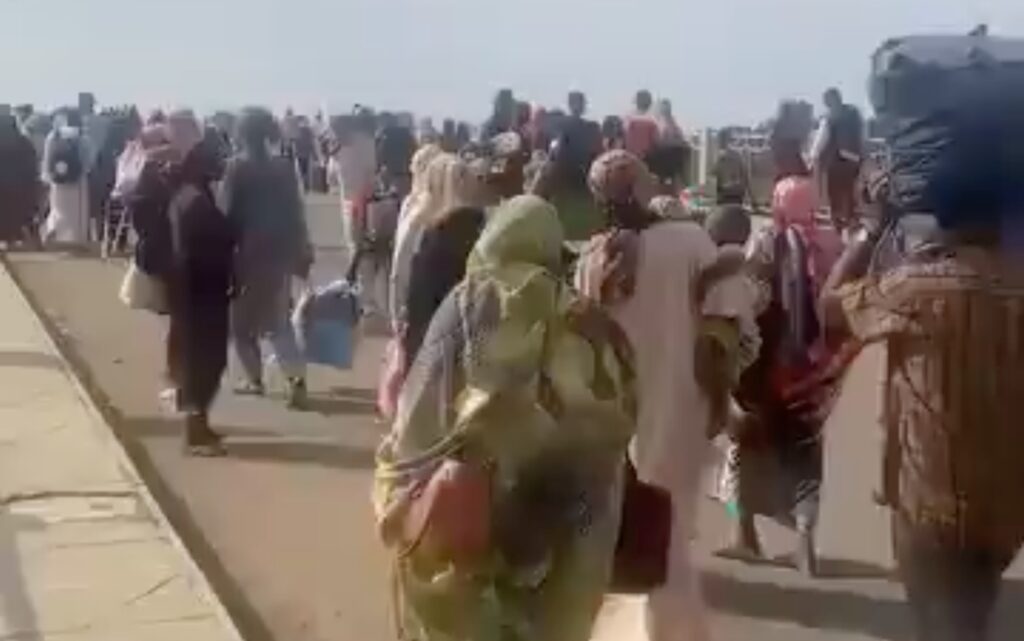
On Saturday, 29th June, Sudan’s Rapid Support Forces (RSF) advanced deep into Sennar State, going to Sinja, taking over the “headquarters of the army’s 17th Infantry Division”. This was a decisive blow, marking the peak of clashes between the RSF and Sudanese Armed Forces (SAF), which began in the area on 25th June, and the emergence of a new conflict hotspot.
These most recent clashes in Sennar and Sinja city have displaced civilians from Abu Hajar, Dinder, and other areas. These civilians include Sennar State locals but also an overwhelming amount of Internally Displaced People (IDP) who had fled conflict areas that were previously attacked and continue to be too dangerous to inhabit such as Darfur, Khartoum and, most recently Gezira State. Civilians continue to flee Sennar State and the surrounding area towards El Gedaref and other eastern states, but it is reported that many are still unable to do so due to the RSF’s continuing advance.
The attack on Sennar State highlights a form of regional control. Sennar State is a significant trade hub and has been utilised since the conflict began as a throughfare between Port Sudan and the rest of the country. The route through Sennar State has crucially supported the distribution of humanitarian aid. Additionally, with Port Sudan having the only working airport in the country, travel through Sennar State is often time a necessary part of the journey.
Approximately 55,440 people have fled Sinja city, the biggest in the state after Sennar city, over the past few days. As we have learnt from previous eruptions of violence, especially following the attack on Gezira State, host communities are already extremely overwhelmed with IDPs in addition to the fact that due to the dire economic circumstances’ assistance is extremely limited if not non-existent.
This new hotspot in Sennar State presents a horrific picture for women who have managed to flee and for those who sadly remain. As we have seen since the war broke out, following an initial military attack and consolidation of power in a region, the RSF has been documented to prey on the civilians by looting homes, businesses and social service facilities and carrying out organised acts of Conflict Related Sexual Violence (CRSV) often including gang rape. Additionally, Sennar State as the previously appointed safe zone following the attack of Gezira State, was a hub for humanitarian aid, specifically sexual and reproductive health care.
SIHA Network has been in contact with service providers include case workers in Sennar State throughout the last few months, who are supporting women who are pregnant and women who are survivors of SGBV and require medical and psychological care. These service providers were crucial in the region and following this attack, it is unclear when we will be in touch with them again and what their own security situation is. Following the attack on Gezira State, we were similarly disconnected from our connections on the ground, and this meant that emergency humanitarian aid for women was stalled.
The parallels between the attack on Gezira State and now Sennar State are stark. SIHA Network has already received unconfirmed cases of SGBV, including rape, against women in Sennar and Sinja city. Similar to previous conflict hotspots there are also extensive cases of missing people and people being torn from their families, reports estimate that there are 1000 disappear persons amongst those 91 are children.
Currently, women need urgent and critical support, including humanitarian aid and support with the express purpose of saving lives, alleviating suffering, and maintaining human dignity. This includes food and water as famine is a large threat of the ongoing conflict in Sudan and especially for the thousands who have now been displaced, they need urgent supplies. Additionally, women require dignity kits as feminine hygiene supplies are often not included in humanitarian aid packages. These kits essential not only to maintaining dignity but also because the alternatives can lead to various health issues. Furthermore, access to sexual and reproductive health care, including emergency services, is currently a primary necessity.
The escalation of conflict in Sennar State represents a grave humanitarian crisis with dire implications for the people of Sudan, particularly women and vulnerable populations. The recent incursion by the RSF into Sennar State has not only displaced thousands but has also disrupted crucial humanitarian aid routes and services. The systematic use of SGBV in conflict zones across Sudan compounds the suffering of women who have already endured displacement and violence.
Recommendations
We stand steadfast in our pervious recommendations and echo the recommendations that were shared by Sudanese civil society on December 24, 2023, for international actors and friends of Sudan to:
- Implement a gender-responsive civilian protection framework in Sudan, ensuring access to community-led humanitarian aid with enforceable consequences for violations.
- Establish a monitored cessation of hostilities and civilian safe zones, supporting an inclusive conflict transformation process led by civilians, particularly women.
- Create an international criminal tribunal, akin to the Rwandan model, to address war crimes and crimes against humanity in Sudan, fostering accountability and preventing future violence.
- Pressure the RSF and SAF to cease violence and participate in a viable political process that includes civilian and women’s participation, ensuring they have no role in Sudan’s governance.
- Increase humanitarian aid support for affected civilians, focusing on IDP communities’ livelihoods, social well-being, and mental health services.
- Support the fact-finding mission by the UN Human Rights Council and extend its mandate. Additionally, support other fact-finding missions to examine the breaches and violations of the Security Council resolutions in Darfur and Sudan and specifically to investigate the massive sexual violence crimes committed across the country.
- Disrupt illicit financial flows benefiting perpetrators of violence and undermining political stability.
